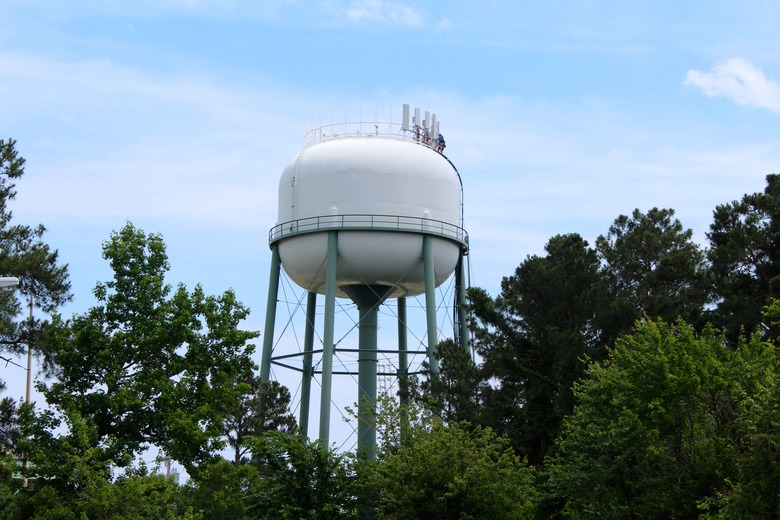How To Calculate GPM From Differential Pressure
Pressure is the driving force behind volumetric liquid flows expressed in GPM (gallons-per-minute) as it is in any flowing system. This derives from the pioneering work on the relationships between pressure and flow first conceptualized by Daniel Bernoulli over two hundred years ago. Today, the detailed analysis of flowing systems and much of flow instrumentation is based on this reliable technology. Calculating instantaneous GPM from differential pressure readings is straightforward whether the application is a pipeline section or a specific differential pressure flow element such as an orifice plate.
Calculating GPM from Differential Pressure in a Pipe Section
Step 1
Define the flow measurement application. In this example, water is flowing downward through a 6-inch Schedule 40 steel pipe from an elevated water tank whose level is 156-feet above ground to a distribution header at ground level where the pressure measures 54-psi. Since the water is driven purely by static head pressure, no pump is needed. You can calculate GPM from differential pressure through this pipe.
Step 2
Determine the differential pressure across the 156-feet of vertical pipe by dividing 156-feet elevation by 2.31-feet-per-psi (pounds-per-square-inch) to yield 67.53-psi at the start of the pipe. Subtracting 54-psi from 67.53-psi results in a differential pressure of 13.53-psi across 156-feet of 6-inch Schedule 40-pipe. This results in a 100-feet/156-feet X 13.53-psi = 8.67-psi differential pressure in 100-feet of pipe.
Step 3
Look up the head-loss/flow data from the chart for 6-inch Schedule 40 steel pipe. Here 1744-GPM of flow results in a differential pressure of 8.5-psi.
Step 4
Calculate actual GPM flow in your case by dividing 8.67-psi by the 8.5-psi listed and extracting the square root of the quotient, since the D'Arcy-Weisbach equation on which the tabular data is based shows that pressure varies as the square of flow velocity (and thus GPM). 8.67/8.5 = 1.02. The square root of 1.02 = 1.099. Multiply the 1.099 flow proportion by the listed 1744-GPM to yield 1761.35-GPM flowing through your 6-inch pipe.
GPM from Differential Pressure in an Orifice Plate
Step 1
Define the application. For this example, a pre-defined orifice plate is installed in the 8-inch header fed by the pipe of Section 1. The orifice plate is sized to produce a differential pressure of 150-inches of H2O (in H2O) differential pressure with a flow of 2500 gallons of water flowing through it. In this case, the orifice plate produces a differential pressure of 74.46-inches of H2O differential pressure, which enables you to calculate the actual flow through the 8-inch header pipe.
Step 2
Calculate the proportion of the full 2500-GPM flow at 150-in H2O when the orifice plate only produces 74.46-in H2O of differential pressure. 74.46/150 = 0.4964.
Step 3
Extract the square root of 0.4964, since flow varies proportionately as the square root of pressure ratio. This results in a corrected proportion of 0.7043, which when multiplied by the 2500-GPM full-range flow, equals 1761.39 GPM. This value is reasonable, since all the flow is coming from the feed pipe of the Section 1 calculation.
Things Needed
- Calculator or spreadsheet
- Physical data for piping type
- Application data for an orifice plate
TL;DR (Too Long; Didn't Read)
Using the lowest differential pressure range possible in an application will result in less permanent pressure loss and improve energy savings in pumped systems.
Warning
Always have pressure applications checked by a professional to be sure piping systems won't rupture in high-pressure cases.
Cite This Article
MLA
Gill, Pauline. "How To Calculate GPM From Differential Pressure" sciencing.com, https://www.sciencing.com/calculate-gpm-differential-pressure-6536540/. 13 March 2018.
APA
Gill, Pauline. (2018, March 13). How To Calculate GPM From Differential Pressure. sciencing.com. Retrieved from https://www.sciencing.com/calculate-gpm-differential-pressure-6536540/
Chicago
Gill, Pauline. How To Calculate GPM From Differential Pressure last modified March 24, 2022. https://www.sciencing.com/calculate-gpm-differential-pressure-6536540/
